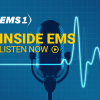By focusing on its mission, “bring value to the community measured in lives saved and quality of life protected,” and a synergistic set of advanced cardiac resuscitation tools, the Rialto Fire department dramatically improved its ROSC rates as well as neurological survival.
The first episode of this special video/podcast series, “Reimagining Resuscitation: Behind the Scenes of Rialto’s Breakthrough,” brought to you by EMS1 and Zoll, breaks down the 7 steps in the ACR toolkit that is reshaping how we approach sudden cardiac arrest.
Join us as Joe Powell, MICP, EMSC, shares the Rialto journey, diving into the first tool: using real-time feedback, and explains how to limit CPR interruptions to four acceptable pauses.
Kevin Joles, NREMT-P, joins Joe to relate how Lawrence-Douglas County Fire and Medical was able to successfully adapt this reproducible approach to improve ROSC rates from 36% to 62% within 8 months.
Joe Holley, MD, FACEP, FAEMS, medical director for the State of Tennessee Department of Emergency Medical Services, and the Memphis and Shelby County Fire Departments, explains the science behind higher chest compression fraction association with higher survival.
Check out the video podcast series here, and watch Episode 1 here.
Coming soon
Join us for the next installment of this video podcast series on Nov. 3, 2020, “Quality of lives protected: Preventing hypoxia with apneic oxygenation.”
Our fifth and final episode of this series, “Reimagining Resuscitation: Behind the Scenes of Rialto’s Breakthrough” will be a live webinar including a Q&A session on Dec. 8, 2020. Send your questions for Dr. Holley, Kevin Joles and Joe Powell to ACR@zoll.com.
References
Review the research cited by Dr. Holley:
1. Christenson J., Andrusiek D., Everson-Stewart S., Kudenchuk P., et al. (2009). Chest Compression Fraction Determines Survival in Patients With Out-of-Hospital Ventricular Fibrillation. Circulation, 120(13), 1241-1247. Available at: https://doi.org/10.1161/CIRCULATIONAHA.109.852202
2. Duchateau FX., Gueye P., Curac S., Tubach F., et al. (2010). Effect of the AutoPulse automated band chest compression device on hemodynamics in out-of-hospital cardiac arrest resuscitation. Intensive Care Medicine, 36(7), 1256-1260. Available at: https://doi.org/10.1007/s00134-010-1784-x














